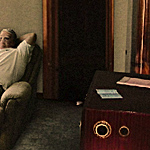 I’ve never seen anything like it: Dale jogs with his arms by his sides, not unlike an Irish step dancer. So, as much as I enjoy spending time with him otherwise, the time came when I had to tell him that our jogging relationship was over. I don’t think I’m being frivolously judgmental in severing a doomed partnership because Dale won’t assume the appropriate jogging form. Whether or not my decision is a good one is immaterial–every innate instinct tells me this is the right decision. There’s a right way to jog and there’s a wrong way to jog. If Dale isn’t interested in investing the effort required to put up his jogging dukes, who is he fooling?
I’ve never seen anything like it: Dale jogs with his arms by his sides, not unlike an Irish step dancer. So, as much as I enjoy spending time with him otherwise, the time came when I had to tell him that our jogging relationship was over. I don’t think I’m being frivolously judgmental in severing a doomed partnership because Dale won’t assume the appropriate jogging form. Whether or not my decision is a good one is immaterial–every innate instinct tells me this is the right decision. There’s a right way to jog and there’s a wrong way to jog. If Dale isn’t interested in investing the effort required to put up his jogging dukes, who is he fooling?
“You’re not kidding?” he asked after I’d made my announcement. “What’s the deal?”
I shrugged. “I told you why, and I’m sorry, but… it’s just not right for me, the way you jog. It’s just wrong.”
Dale stood stock still, his head cocked to the side as if that might make it easier for my words to penetrate. Then, “So… it’s about vanity? I don’t get it. Assuming I’m not moving my arms the right way, you’re worried that people will think we’re… what, deviants?”
“It’s not vanity at all. The way you run is conspicuous the same way that someone chewing without removing the fork from their mouth would be conspicuous. Naturally, it draws the attention of onlookers, and, frankly, I’d rather not be noticed like that. That’s not vanity.”
“But your base concern is superficial, isn’t it?”
“This isn’t about wearing the wrong color shorts or not having the coolest haircut,” I said.
“No, I mean, isn’t this like… casting out a friend because they’re knock-kneed?”
I shook my head. “I’m talking about a choice here, an indefensible choice. You and I are no different physically, yet you’re running with your arms pinned to your sides, why? Is it because you’d be flung off balance into a ditch otherwise? No, it’s because that’s how you choose to conduct yourself. I mean, if you smoked a pipe while we were jogging, or… if you insisted on wearing a feathered headdress, then I’d have to take the same considerations, wouldn’t I?”
“But where do you draw the line?”
“Well, here is one place where I draw the line,” I said. “The line is drawn.”
Determining interpersonal relationships based upon unreasonable criteria is a recipe for a solitary existence. I know that. I merely expect a modicum of social propriety. This is a long-standing principle of mine, and it’s always stood me in good stead.
I was only 10 when our father moved to a new house in the suburbs, and my younger brother and I took the opportunity to creature around the neighborhood to get the lay of the land. Before long we were approached by a boy around my age who invited us into his home to see his dad’s piranha–a promising start to a provisional friendship.
After some friendly chat the three of us headed back out into the summer heat so the boy could show us his favorite spots, including an impressive rope swing over a deep creek, and a nicely-appointed fort in the crook of a dead tree. “Do you guys climb?” the boy asked. My brother and I glanced at each other, then shook our heads. “Trees,” he clarified, indicating the branches above. “I climb all the time. I never wear shoes.”
Indeed, the soles of his feet were like dried leather. As he scaled the tree the bark stripped away to reveal spiky pulp, but his feet were so tough that the splinters bent back like dry grass. I winced with amazement: my own tender feet would have been instantly impaled.
My brother and I craned our heads back to follow the boy’s progress, and that’s when things took an unfortunate turn. Like a wee baby gerbil emerging from its bed of cedar, a single pink testicle greeted us both from the boy’s red shorts. To my horror I found myself unable to turn away for a moment, standing agape as the boy’s vertical thrusts all but assured the wayward scrotum’s imminent and glorious freedom. The boy’s utter obliviousness to this anatomical travesty only made it that much worse.
When I looked over at my brother he was already looking back at me, and there was suddenly no need for communication. A primal need for survival had kicked in and we were of a single mind. When we turned to leave it was perfunctory, the way you leave the theatre when the curtain slides closed and the lights come up.
“Hey! Guys?” The boy was fifteen feet from the ground, and straddling the trunk of the tree like a koala. I turned around without breaking from our retreat. “Where are you going? You wanna do something else?”
“No, that’s okay,” I said, realizing only then that we would never know the boy’s name. “We have another thing we have to go to now, so, we’re gonna-”
“Okay, I’ll see you next time, okay?”
You have to draw the line somewhere though. Even a child knows that.
 Agent of torment Fred Brookbank is recounting a conversation we shared earlier. As I spin interest from revulsion–a latter day Rumpelstiltskin, I am–Kelly will listen attentively to anything the man says, because she’s not really listening to anything. I know this because whenever Fred looks at me, I glance at Kelly and see her take advantage of Fred’s redirected attention to adjust something on her person. Straightening her blouse, shifting in her seat, or brushing her hair behind her ear–she wants to impress Fred. She’s doing it slowly, the way a lioness creeps forward only when her prey isn’t looking.
Agent of torment Fred Brookbank is recounting a conversation we shared earlier. As I spin interest from revulsion–a latter day Rumpelstiltskin, I am–Kelly will listen attentively to anything the man says, because she’s not really listening to anything. I know this because whenever Fred looks at me, I glance at Kelly and see her take advantage of Fred’s redirected attention to adjust something on her person. Straightening her blouse, shifting in her seat, or brushing her hair behind her ear–she wants to impress Fred. She’s doing it slowly, the way a lioness creeps forward only when her prey isn’t looking. I’ve never seen anything like it: Dale jogs with his arms by his sides, not unlike an Irish step dancer. So, as much as I enjoy spending time with him otherwise, the time came when I had to tell him that our jogging relationship was over. I don’t think I’m being frivolously judgmental in severing a doomed partnership because Dale won’t assume the appropriate jogging form. Whether or not my decision is a good one is immaterial–every innate instinct tells me this is the right decision. There’s a right way to jog and there’s a wrong way to jog. If Dale isn’t interested in investing the effort required to put up his jogging dukes, who is he fooling?
I’ve never seen anything like it: Dale jogs with his arms by his sides, not unlike an Irish step dancer. So, as much as I enjoy spending time with him otherwise, the time came when I had to tell him that our jogging relationship was over. I don’t think I’m being frivolously judgmental in severing a doomed partnership because Dale won’t assume the appropriate jogging form. Whether or not my decision is a good one is immaterial–every innate instinct tells me this is the right decision. There’s a right way to jog and there’s a wrong way to jog. If Dale isn’t interested in investing the effort required to put up his jogging dukes, who is he fooling? Listen to each commercial closely and you’ll hear them. There: the rin tinn fuckulation of the ever-fucking bells. You’re not meant to listen to commercials like that, not with your full attention. They’re supposed to wash over you, to leave you with that unique feeling of chipper inadequacy. But sometime after Labor Day the marketeers start slipping in the bells, subtle at first, like global warming. Until, by mid December, they’re all you can hear. Ad agencies believe that December bells in commercial soundtracks are as potent as Barry White music on a third date.
Listen to each commercial closely and you’ll hear them. There: the rin tinn fuckulation of the ever-fucking bells. You’re not meant to listen to commercials like that, not with your full attention. They’re supposed to wash over you, to leave you with that unique feeling of chipper inadequacy. But sometime after Labor Day the marketeers start slipping in the bells, subtle at first, like global warming. Until, by mid December, they’re all you can hear. Ad agencies believe that December bells in commercial soundtracks are as potent as Barry White music on a third date. I went with L. to check out the new neighborhood café. Ten minutes later our clever banter had reached a natural pause over antipasti, and I took advantage of the fermata to enjoy the bistro’s ambience of carefully-orchestrated comfort. Candles glowed, glasses tinked, and tendrils of conversation wafted over from satellite tables. Lapses in conversation are inevitable, like rests in music. And, inasmuch as they afford one the opportunity to listen, I welcome the lapses. When they come, the other senses can reach outward to compensate, and it’s important not to overlook these moments as opportunities for future conversation.
I went with L. to check out the new neighborhood café. Ten minutes later our clever banter had reached a natural pause over antipasti, and I took advantage of the fermata to enjoy the bistro’s ambience of carefully-orchestrated comfort. Candles glowed, glasses tinked, and tendrils of conversation wafted over from satellite tables. Lapses in conversation are inevitable, like rests in music. And, inasmuch as they afford one the opportunity to listen, I welcome the lapses. When they come, the other senses can reach outward to compensate, and it’s important not to overlook these moments as opportunities for future conversation. Liz breezes in and catches the edge of my office door as if fighting the hall tide. “Hey, you have those photos ready from yesterday’s shoot?”
Liz breezes in and catches the edge of my office door as if fighting the hall tide. “Hey, you have those photos ready from yesterday’s shoot?” “I talked to him about the loan and he said he’d call me back.”
“I talked to him about the loan and he said he’d call me back.” I’m just home from the airport, and the living room where I grew up still smells of cigars and mildew. It’s not my home anymore, but fragments of my family still live here. Cousin Jacob regards me over the rim of his glasses without lifting his head from his bible. “Come on in, mug, take a load off.” Jacob calls everyone by the informal, “mug.” I think it’s a contraction of “man” and… I’m not sure. Possibly “thug.”
I’m just home from the airport, and the living room where I grew up still smells of cigars and mildew. It’s not my home anymore, but fragments of my family still live here. Cousin Jacob regards me over the rim of his glasses without lifting his head from his bible. “Come on in, mug, take a load off.” Jacob calls everyone by the informal, “mug.” I think it’s a contraction of “man” and… I’m not sure. Possibly “thug.” Walking does not come naturally to me.
Walking does not come naturally to me. The path from my office to the microwave bank in the kitchenette takes me through each of my office’s departments like the “It’s a Small World” conveyor at Disney World. Every tribe is huddled into its respective cluster, each with its own unique culture. For the hapless isolationist this trip affords a greater than ideal opportunity for engagement, but as I’ve been treading the same route for nigh on a decade, I’ve come to rely on my instincts to see me through. In fact there are times when I don’t realize I’ve made the trip until I’m back at my desk, hunched over my gruel.
The path from my office to the microwave bank in the kitchenette takes me through each of my office’s departments like the “It’s a Small World” conveyor at Disney World. Every tribe is huddled into its respective cluster, each with its own unique culture. For the hapless isolationist this trip affords a greater than ideal opportunity for engagement, but as I’ve been treading the same route for nigh on a decade, I’ve come to rely on my instincts to see me through. In fact there are times when I don’t realize I’ve made the trip until I’m back at my desk, hunched over my gruel. My friend Julia is so slight, so unassuming, that meeting her is like having a premonition that you’ll meet her. It’s not so much that she doesn’t leave an impression, but rather that it’s difficult to interpret it. “Let me show you something,” she was saying to me.
My friend Julia is so slight, so unassuming, that meeting her is like having a premonition that you’ll meet her. It’s not so much that she doesn’t leave an impression, but rather that it’s difficult to interpret it. “Let me show you something,” she was saying to me.